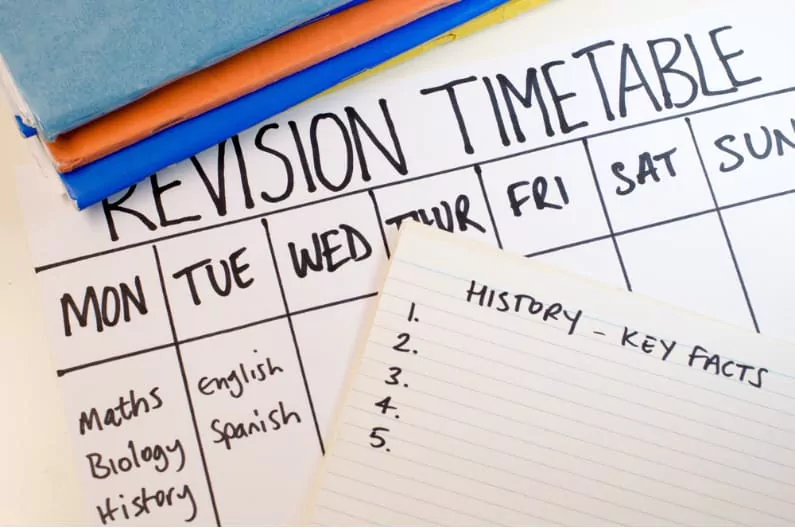How To Revise Effectively? Proven Strategies

If you’ve ever found yourself staring blankly at a pile of study materials, feeling overwhelmed and unsure where to begin, don’t worry – you’re not alone. The problem is not the amount of content to be covered but rather your approach to the revision process. In this comprehensive guide, we will unlock the keys to “how to revise effectively” to transform your study sessions into productive learning experiences.
- What is Revision, and Why is it Important?
- Proven Strategies to Revise Effectively
- Step 1: Understand Your Learning Style
- Step 2: Create a Revision Plan
- Step 3: Create a Distraction-Free Environment
- Step 4: Active Revision Techniques
- Step 5: Review Regularly
- Step 6: Stay Healthy
- Step 7: Take Breaks
- Step 8: Use a Variety of Resources
- Step 9: Stay Positive and Motivated
- Step 10: Review and Reflect
- Wrapping Up
1 What is Revision, and Why is it Important?
Before we delve into “how to revise effectively,” it’s crucial to understand what revision is. Revision is the act of reviewing, altering, and enhancing learning materials to bolster comprehension and retention. It is the cornerstone of successful learning as it helps to consolidate the information we have learned and prepares us for evaluations or examinations.
2 Proven Strategies to Revise Effectively
Step 1: Understand Your Learning Style
The first step in how to revise effectively is to know yourself as a learner. We all have different learning styles – visual, auditory, kinesthetic, or a blend of these. Identifying your style will help tailor your revision process to your specific needs.
- Visual learners prefer visual aids like diagrams, charts, and pictures. If this is you, incorporate infographics and mind maps into your revision process.
- Auditory learners understand best when they hear information. Consider recording lectures or reading out your notes aloud.
- Kinesthetic learners are hands-on learners. They learn best by doing. If you’re a kinesthetic learner, try rewriting your notes or teaching the material to someone else.
Step 2: Create a Revision Plan

One essential aspect of how to revise effectively is creating a revision plan. A plan structures your study time and gives you a clear overview of what needs to be done. Here are a few tips on creating an efficient revision plan:
- Start early: Begin revising well before your test or exam date. Cramming might help you pass an exam, but it won’t lead to long-term retention of information.
- Break it down: Don’t try to revise everything at once. Break down your revision into manageable chunks. This helps prevent burnout and improves focus.
- Be realistic: Make sure your plan is achievable. It’s better to spend an hour or two studying every day than to attempt marathon study sessions.
Step 3: Create a Distraction-Free Environment

The environment you study in greatly affects how effectively you can revise. Ensure your study area is quiet, clean, and free from distractions. This means turning off your phone or at least setting it to silent, closing any irrelevant tabs on your computer, and informing those around you about your study schedule to avoid interruptions.
Step 4: Active Revision Techniques

Understanding how to revise effectively requires familiarising yourself with active revision techniques. These methods engage your brain at a higher level and enhance your understanding and recall of the material. Here are some active revision techniques:
- Flashcards: These are excellent for memorising definitions, formulas, or any chunk of information. They’re also portable, allowing you to revise on the go.
- Teaching others: If you can teach a concept to someone else, it means you’ve understood it well. This technique also highlights any areas where your understanding might be lacking.
- Practice exams: These are arguably the most effective revision technique. Practice exams help familiarise you with the exam format and improve your ability to recall information under pressure.
Step 5: Review Regularly
Knowing how to revise effectively is not about how much time you spend studying but how often you review the material. Spaced repetition, reviewing information at increasing intervals, is a proven method to move information from your short-term to long-term memory.
Step 6: Stay Healthy

While it might seem unrelated, your physical health has a direct impact on your brain’s capacity to revise effectively. A well-rested, well-nourished body can significantly enhance cognitive functions such as memory and concentration.
- Sleep: Sleep is crucial for memory consolidation. Ensure you’re getting 7-9 hours of sleep per night, especially in the days leading up to your exam.
- Nutrition: Maintain a balanced diet rich in fruits, vegetables, lean proteins, and healthy fats. Avoid excessive caffeine and sugary snacks that can lead to energy crashes.
- Exercise: Regular physical activity boosts blood flow to the brain, improving cognitive function and reducing stress.
Step 7: Take Breaks
An integral part of understanding how to revise effectively is recognising the importance of taking breaks. Studies have shown that the brain absorbs information more effectively when study sessions are broken up into chunks, a concept known as the Pomodoro Technique.
Here’s how to implement it:
- Choose a task you want to work on.
- Set a timer for 25 minutes.
- Work on the task until the timer goes off.
- Take a short break (5 minutes is OK).
- Every 4 “Pomodoros”, take a longer break (15-30 minutes).
Step 8: Use a Variety of Resources
The best way to revise effectively is to utilise a variety of resources. Different resources present information in unique ways, allowing you to gain a more rounded understanding of the topic.
- Textbooks: These provide comprehensive coverage of your subject and often include practice questions and summaries at the end of each chapter.
- Online resources: Websites, educational YouTube channels, podcasts, and online courses are excellent supplementary resources.
- Study groups: Discussing topics with peers can deepen understanding and reveal new perspectives.
Step 9: Stay Positive and Motivated

Staying positive and motivated is key to knowing how to revise effectively. It’s normal to feel stressed or overwhelmed at times but remember that revision is a process, and every bit of effort you put in brings you one step closer to your goal.
- Set goals: Have clear, achievable goals for each study session.
- Reward yourself: After reaching a study goal, reward yourself with a short activity you enjoy.
- Visualise success: Imagine the success you will achieve after your exams. This can be a powerful motivator.
Step 10: Review and Reflect
Finally, an effective revision process is one that evolves. After your exams, take the time to reflect on what worked and what didn’t. This insight can then be used to refine your approach, improving how to revise effectively for future exams.
3 Wrapping Up
Mastering how to revise effectively is not about cramming the night before an exam but developing a sustainable, balanced, and personalised approach to learning. Remember, it’s a process, and everyone’s journey is different. So, don’t be too hard on yourself if you struggle at first. With time, patience, and practice, you can develop a revision technique that works best for you and witness a significant improvement in your study routine. Good luck with your revision, and here’s to your academic success!
Community Q&A
About This Article
This article has been viewed 458 times.



